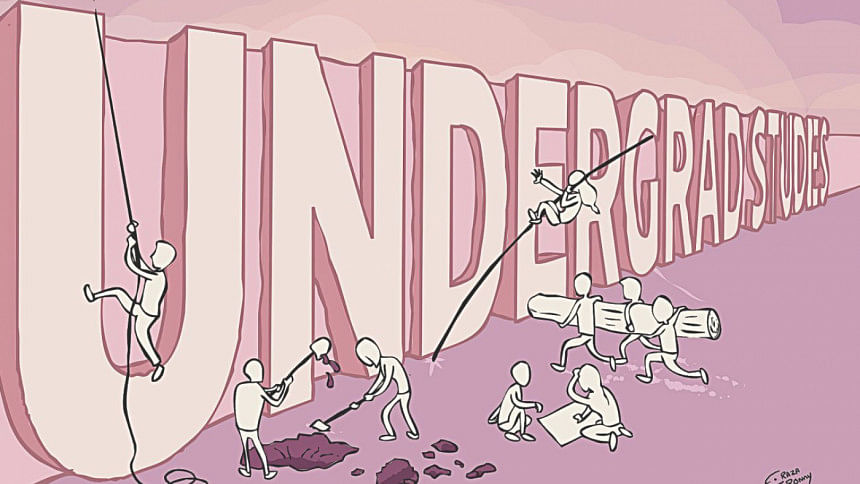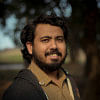LOOKING BEYOND THE FIRST HURDLE

There are 40 public universities in Bangladesh, a couple of international universities, and 92 private ones (as of February 2016). Between themselves, these universities provide a vast array of degrees and courses. Whether or not those numbers are enough is a fact up for argument, but it is true that an overwhelming majority of the 800,000 students who passed through the proverbial sieve at HSC target only a tiny fraction of those available university seats for higher studies.
Some want to go to a specific university, while some want to study a specific subject, but most fail to reach this target. The whole ordeal leaves a considerable amount of students disappointed and unsure of their immediate future. Many seem to forget that there is more than one way to achieve a certain academic target; as long as the aim is something objectively valuable, i.e. a degree, and not a superficial concept, like the "status" that comes with a certain institution. This article discusses some of those options.
The first thing to tell oneself in this difficult situation is that an undergraduate degree is only the stepping stone to the vast sea of higher studies. For instance, an undergraduate degree in the applied field of a science discipline wouldn't necessarily mean that one's education will be shackled in those specifications for the rest of their lives. In Bangladesh, job opportunities and lack of research facilities drive students away from the study of pure physics, chemistry, mathematics, etc. Students with a passion for these, who'd otherwise excel in these fields, are instead driven towards their application sides, to engineering and technical degrees, some are even driven off course towards a whole new discipline. But the pursuit of your dream doesn't need to be over, if you make smart decisions at an early stage. As long as one's undergraduate degree is closely related to, and shares necessary coursework, with their final aspirations, there's nothing stopping them from taking that path for a postgraduate degree,
followed by a career.
A common and much treaded path in this regard is the jump from applied science degrees and even engineering degrees to pure physics, chemistry or math. A degree in pure chemistry, on the other hand, can potentially open doors towards higher studies and a career in pharmaceuticals, which should be good news for anyone with dreams of studying pharmacy who hasn't been able to get in. Similarly, a degree in any of the pure
disciplines will open possibilities towards a postgraduate degree in the applied fields. Changes from botany to microbiology, biotechnology or even nanotechnology are some of the possibilities.
But what about someone who doesn't have a clear idea of what they see themselves doing in the future? Maybe it's not a clear picture, but a person usually does have a sense of what they're good at and what they're bad at, and in many cases this helps them decide a career path. Pure subjects, like physics, chemistry, finance or economics give you the most room for pivoting later on. The drawback to these options is the fact that top grades across board and a considerable portfolio of work done in the target field are often prerequisites to a career.
Beyond these practical issues, there are often the sentimental issues of not being able to get in to one's university of choice. Dhaka University, BUET, IBA and public medical colleges are some of the names that'll induce a pang in the hearts of many. But the fact of the matter is, the degrees that these universities provide are very rarely institution exclusive, and if one is brave enough to truly devote themselves to their passion, they will find that many universities are waiting with open arms to welcome them. The expense that comes with private universities is a matter of concern, but many universities offer waivers to students with a certain academic pedigree. North South University, for instance, gives out waivers to students who achieve top ranks in their admission tests.
I want to end this article with the story of Dr Sufi Mostafizur Rahman, Professor of Archaeology in Jahangirnagar University. In 2000, he led the team that discovered Wari-Bateshwar, an archaeological site in Narsingdi that dates back to 450 BC. He made one of the ground-breaking archaeological discoveries in the last couple of decades, but many years ago, he had travelled to Dhaka to become a doctor. His story starts as a dejected undergrad student of history in Jahangirnagar University, until a visiting professor from Cambridge kindled his aspirations in archaeology with tales of Wari-Bateshwar. His story of success may be difficult to emulate, but it just goes to show that undergrads only scratch the surface of an academic life that may turn out to be completely different from the one presumed.
Azmin is a freshman at University of Dhaka.

 For all latest news, follow The Daily Star's Google News channel.
For all latest news, follow The Daily Star's Google News channel. 



Comments